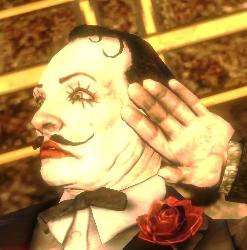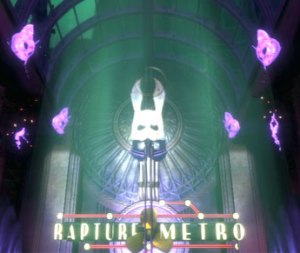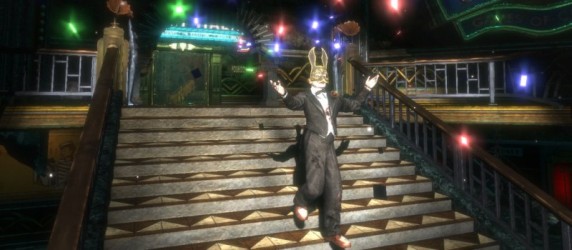N.B. I originally wrote this for GayGamer on March 24, 2011. GayGamer has since ceased to exist, so I am republishing this here, and will also do so with a few other pieces over the next few months.

Rapture is a failed dream–an attempt at utopia. Such political and philosophical ideals intrinsically have high aims, and when remaining in the realm of dreams and words on pages, often seem as if they are an ideal that will solve peoples’ problems. Unfortunately, a utopia starts falling apart as soon as human beings enter. Rapture then becomes a funhouse mirror, distorting an individual’s image by building on what was fundamentally there.
Which is to say, everyone in Rapture has their own insecurities and identity problems. For me, however, that came into sharp focus with the character of Sander Cohen. Much as with any character in BioShock, what can be gleaned from his character is not told to us outright. I had the good fortune to speak with Ken Levine about Cohen recently, and as he stated about the game in general, “You have to trust your audience.”
In this case, trusting one’s audience means not treating them as if they need everything spelled out in exact terms. Much of the named cast is Jewish, for instance, but outside of their names, it is only remarked upon in the case of a few (Tenenbaum in particular). In Cohen’s case, that means the game never explicitly says Sander Cohen is someone who likes members of his own sex. Of course, as Levine confided, “If you asked Sander Cohen if he was gay, he’d probably say no.” It’s in the details.
 Cohen is a tragic figure. A man who was known for heights of artistic achievements in poetry, music, plays, and sculpture. Most of his character is explored in Fort Frolic, though you can find references throughout the game (and even some in BioShock 2). He was part of an intellectual elite that sought to elevate Rapture and extol its virtues through creative expression. There was always a hint of trouble, however. As Leigh Alexander explores, his struggle with his Muse speaks to the larger struggle and obsessions that Rapture would later face.
Cohen is a tragic figure. A man who was known for heights of artistic achievements in poetry, music, plays, and sculpture. Most of his character is explored in Fort Frolic, though you can find references throughout the game (and even some in BioShock 2). He was part of an intellectual elite that sought to elevate Rapture and extol its virtues through creative expression. There was always a hint of trouble, however. As Leigh Alexander explores, his struggle with his Muse speaks to the larger struggle and obsessions that Rapture would later face.
His inspirations are drawn from many different sources. His Wikia article mentions George M. Cohan, a man who was known for his prolific work with Broadway and the U.S. musical. In an interview with Edge, Ken Levine revealed how he is a Noël Coward figure gone horribly awry. Then looking at his in-game design, he reminds me of Salvador Dali, with his quirky mustache. One can also easily explore references to Cole Porter and other artistic giants. These men represent quite a variety of sexuality, both firmly in place and ambiguous. Clearly, Cohen is a man drawn together of many parts, and not constrained to a single image.
Cohen, like many artists, is seeking approval. In the context of his work, that means praising his writing, singing his songs, and providing lovely critiques of his work. In the context of his life, it speaks to deeper-seated issues at which he only hints. One such instance is an audio diary that includes a poem called “The Wild Bunny:”
I want to take the ears off, but I can’t.
I hop, and when I hop, I never get off the ground.
It’s my curse, my eternal curse!
I want to take the ears off but I can’t!
It’s my curse! It’s my fucking curse!
I want to take the ears off!
Please!
Take them off!
Please!
 The image of the bunny mask is one that serves as very integral to Cohen’s work. It’s incorporated into his sculptures, seen around Fort Frolic, and even has place in his bedroom. The fact that it is a literal mask serves as a reminder that most people in Rapture do wear masks of some sort–compare audio diaries by people and about them, for instance. Cohen in particular? Levine expands upon an issue many people probably feel, “Cohen is wearing a mask because he’s not comfortable with himself.”
The image of the bunny mask is one that serves as very integral to Cohen’s work. It’s incorporated into his sculptures, seen around Fort Frolic, and even has place in his bedroom. The fact that it is a literal mask serves as a reminder that most people in Rapture do wear masks of some sort–compare audio diaries by people and about them, for instance. Cohen in particular? Levine expands upon an issue many people probably feel, “Cohen is wearing a mask because he’s not comfortable with himself.”
In comparison to the other elite players in Rapture’s power structures, Cohen is among the most visible to a public eye. As an artist, his work depends on him releasing bits of himself for the public to consume. He offers a service like many of the others, but his is one which begs for public scrutiny, adulation, and patronage. Scrutiny has the tendency to bring to light characteristics about one’s self that might not be comfortable to hear, however.
As “The Wild Bunny” illustrates, the mask he wears has allowed for certain actions. He can hop, but it is in vain. It never actually gets him anywhere. The reference to the ears is curious when I consider that Levine mentioned among the reasons that particular mask was chosen was for convenience, as it served as visually distinctive in a scene where a sculpture of himself is staring in a mirror. The game does have other masks, ones of cats and bird (the latter somehow recalling plague doctor masks that would infiltrate the Commedia Dell’arte scene), but in terms of seeing an image from all angles, the ears serve as a much more distinctive feature.
Of course, while Levine and his fellow designers may not have deliberately intended the meaning, the use of the rabbit is particularly striking when one considers the issue of Cohen’s sexuality. Rabbits have long been known as tricksters, and in how Cohen uses the player, as well as how he is using a mask to deflect close scrutiny of himself, it serves as a very apt choice of animal. Furthermore, rabbits are known as symbols for fertility (if you ever wondered why both eggs and rabbits are used as symbols of Easter), and in the case of Cohen, putting on such a mask can be seen as a further indication of his desire to project an image of a particular type of sexuality to distract from further scrutiny.
How do we even know Cohen is homosexual? Considering the time period, and the eras of nostalgia BioShock evokes, it is useful to keep in mind the Hays Code that was at one time enforced in the United States. Homosexuality was forbidden to be discussed outwardly in films, though this did not prevent the inclusion of topics broaching such. Instead, ‘coding’ became a way of recognizing when people were discussing a man or woman who may not be of the heterosexual sort.
While the censorship was deplorable, it did cause people to play with those boundaries and create their own set of symbols and meanings. Which is something we’re seeing here. Cohen is never labeled as just gay. What we have are audio files calling him an old fruit, for instance. Atlas discusses his insanity and talks about how he’s a Section Eight, which stood for someone unfit to serve in the military for mental reasons, or for reasons of sexual perversion. Atlas clearly means the former, though the hints of the latter do not seem far from the mark.
All of this is particularly poignant considering a line from Andrew Ryan’s opening speech as we descend to Rapture:
A city where the artist would not fear the censor.
Was Rapture as free as it claimed, or was Cohen censoring himself?

In exploring Cohen’s relationship with Silas Cobb, one of his disciples you are sent to kill, Cobb discusses the mentor situation he shared with Cohen directly, but also hints at something else: “I used to love you, I used to think you were a musical genius. You know why? Because you paid my rent, you ancient hack!” Love here could well hint at something sexual, but not necessarily. Emotions run high in Rapture, and among artists, the stereotype is that emotions are allowed to explode all over the place. However, the specific use of the word, in a world which doesn’t seem to flippantly use it, automatically made me examine the relationship and further words spoken.
When fighting Cobb’s minions, he further states, “It’s all a game, errand boy! Cohen, Ryan! Two old birds pullin’ on each other’s milk sticks!” The innuendo there is pretty straight forward, and in consideration with what else has been said, seems to paint a picture further insinuating at Cohen’s interests. Of course, this led me to wondering what, if anything, happened between Ryan and Cohen.
Cohen ends up hating Ryan. In one of his audio diaries he states very clearly:
I could have been the toast of Broadway, the talk of Hollywood. But, instead, I followed you to this soggy bucket. When you needed my star light, I illuminated you. But now I rot, waiting for an audience that doesn’t… ever… come… I’m writing something for you, Andrew Ryan… it’s a requiem.
As Levine opined, real hate is very difficult to come by without love. Therefore, the relationship they shared obviously ran high on passion, particularly in building Rapture. In the case of Cohen, it led to resentment of what could have been, the opportunities he squandered. Considering the hints at this sexuality, it’s difficult not to read into it some unrequited feelings.
Did he ever approach Ryan? Did Ryan ever reciprocate if so? The game never tells us, and Levine stated that if it isn’t in the game, the designers and writers don’t fully flesh it out as it would be pointless. As regards love, he stated, “Even if there is no sexual component, there is romantic component in a lot of peoples’ love for each other.” In my mind, this means we are encouraged to wonder, even if we cannot prove it. Either way, Ryan did end up in another relationship, and had his focus shifted by a civil war.
 The fact that Cohen ends up murderous means he is in no way different than the vast majority of Rapture citizens. Levine mentioned that among his team’s goals were to create human beings, which meant that everyone was treated equally. Everyone also had the same capacity to fall and become depraved killers. What’s curious about him is what he decides to do with that urge: make art.
The fact that Cohen ends up murderous means he is in no way different than the vast majority of Rapture citizens. Levine mentioned that among his team’s goals were to create human beings, which meant that everyone was treated equally. Everyone also had the same capacity to fall and become depraved killers. What’s curious about him is what he decides to do with that urge: make art.
Jack, as the player, interacts with Cohen outside of just these audio diaries, after all. He wants us to kill his disciples, artists he locked in with him in Fort Frolic, and has turned against. They have in varying ways betrayed him. The betrayal is focused largely on the fact that they wish to outgrow him and become their own artists, as seen with how each one we fight is a different type of splicer. One is nitro, one has the ice plasmid, and one is Houdini. They each have their own disciplines of art, their own persons, and it is clear that in Cohen’s rise to fame he became very much of a tyrant.
Cohen could not control his own urges, and the oppression of such seems to have pushed out a desire to be controlling of everything else. When Anna Culpepper is critical of him, he has her killed, with the help of Ryan. Due to his lack of control over himself, he attempts to exert that control over others. He is the prototypical Republican bathroom scandal.
As ever, he pushes that one step further by having the player not only kill his disciples, but photograph them in their death poses for his Quadtych, a piece whereby people can remember him when he’s gone. It is twisted on many levels, beyond just the grotesque quality his work now displays. The use of the word Quadtych is odd in itself, as it brings to mind the often religious triptych. The proper term for a four-paneled polyptych would be tetraptych, however. This both distances itself from the actual artistic conventions of that type of work, as well as calling upon the reverence that particular medium brings to mind.
The work is also disturbingly sensual in some regards. He requires visual proof of the dead forms of his former students for his work of art. The reverence for their death serves as a warning to others of what could happen if they cross him, as well as showing his power over them. The mixture of the ability to wield power over their lives after they have rebuffed his tutelage, as well as to deliberate over their corpses so long speaks to a man who sees beauty in what the player has done, regardless of whether or not the player does.
How one decides to deal with Cohen could theoretically be said to reflect how one feels towards Cohen himself. Unfortunately, it would be more apt to say it reflects the player’s feelings toward achievements. Three achievements are associated with whether or not you attack Cohen: Irony encourages you to take a picture of his corpse; to get all the Power to the People stations, you must coax him out of his bedroom in Olympus Heights to attack you; and Found Cohen’s Room is requisite on the same as the previous. The message the achievements get across is that Cohen is an obstacle to remove, even if you can leave him alone. For me, playing on a PC where achievements did not matter, it was reminiscent of the decision to save or harvest the Little Sisters.
Which fits in with the BioShock team’s vision of everyone being on equal footing and treated the same. He is considered a boss character, is no easier than other fights, and warrants his own achievements, similar to Steinman, Wilkins, Ryan, and Atlus. He is reinforced as a major player, which should have already been obvious in how he traps the player in Fort Frolic.
Sander Cohen serves as an example of what repression can do to anyone, though it may strike a particular chord with issues concerning sexuality. It is also heartening to see that BioShock not only captured an era’s politics in the larger sense, but did not shy from exploring how it affected individuals from many different backgrounds. In a world where Cohen was not free to be himself or fully admit to himself who he was, he quickly succumbs to the lure of becoming a powermonger and control-freak. At the same time, his own struggles make it difficult to not have equal measures of empathy as revulsion.
Many thanks to Ken Levine for taking the time to discuss this post and Sander Cohen with me.
